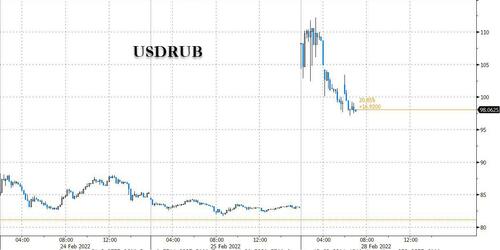Russia More Than Doubles Interest Rate To 20% To Halt Rouble Collapse, Suspends Stock Trading On Moscow Exchange
With the ruble plunging overnight after the West imposed tough new sanctions over the war in Ukraine, crashing as low as 115 against the dollar with the USDRUB last seen just south of 100…
… early on Monday, Russia’s central bank more than doubled interest rates to 20% from 9.5% in an effort to halt the collapse of the ruble, which has gone into freefall. The Bank of Russia also said on Sunday that it would resume buying gold in the domestic market as it tries to shore up its finances and find ways around sanctions on its activity.
“External conditions for the Russian economy have drastically changed,” the Bank of Russia said in a statement. “The increase of the key rate will ensure a rise in deposit rates to levels needed to compensate for the increased depreciation and inflation risks. This is needed to support financial and price stability and protect the savings of citizens from depreciation.”
While the idea is that higher interest rates increase the return to investors, luring foreign capital to the country and pushing up the exchange rate, it is unlikely that investors will flood back into the “safety” of the ruble as long as sanctions are ongoing.
Overnight, the Russian central bank also banned brokers from selling securities on behalf of non-residents, with an eye to halting the decline in domestic asset prices.
In a statement on its website, the Bank of Russia said the foreign exchange, money and repo markets of the Moscow Exchange will open at 10 a.m. local time and that it will “evaluate the timely opening of trading in other markets depending on how the situation develops.” The decision will be announced by 1 p.m. Moscow time (7 p.m. in Tokyo), and trading will start at 3 p.m. if it decides to open.
At the time of writing, the market was still closed.
On Saturday, the U.S. and major European nations said select Russian banks will be removed from SWIFT, the key financial infrastructure banks use to send money across borders. Japanese Prime Minister Fumio Kishida on Sunday said Japan will join the sanctions.
As the NIkkei notes,, Japanese brokerages stopped accepting new buy orders for the ruble amid liquidity concerns. Traders Securities, which operates online foreign exchange services, said it expects difficulties in executing trades and providing rates, warning it “may be forced to close our customers’ Russian ruble/yen positions.”
Asian stock and currency markets were volatile in the morning as investors weighed new sanctions on Russia for its invasion of Ukraine, as well as developments on peace talks between the two countries. Japan’s benchmark 225 stock index closed 0.19% higher after falling as much as 0.8% in early morning trading as investors weighed the sanctions as well as developments of potential peace talks between Ukraine and Russia. South Korea’s Kospi stock index opened slightly lower but ended 0.84% higher. The Japanese yen swung against the U.S. dollar, strengthening to around 115.06 to the greenback before weakening to 115.60.
Oil prices rallied in the morning amid rising concerns over supplies from the world’s leading oil producer. North Sea Brent futures on the London market, an international benchmark, rose to $105 per barrel immediately after the start of trading Japan time, about $7 higher than the settlement price last week.
Tyler Durden
Mon, 02/28/2022 – 07:22
via ZeroHedge News https://ift.tt/9xhe4jd Tyler Durden
